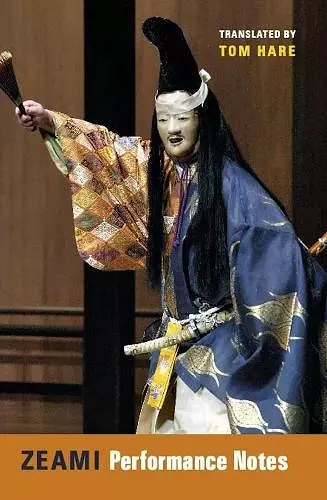Zeami
Performance Notes
Motoyiko Zeami author Tom Hare translator
Format:Paperback
Publisher:Columbia University Press
Published:29th Jul '11
Currently unavailable, and unfortunately no date known when it will be back

Zeami (1363-1443), Japan's most celebrated actor and playwright, composed more than thirty of no drama's finest plays. He also wrote a variety of texts on theater and performance that have, until now, been largely unavailable in English. Zeami: Performance Notes presents the full range of the artist's critical thought on the subject, focusing on the aesthetic values of no and its antecedents, as well as the techniques of playwriting, the place of allusion, the training of actors, the importance of patronage, and the relationship between performance and broader intellectual and critical concerns. Spanning more than four decades, these texts reflect the essence of Zeami's instruction under his famous father, the actor Kannami, and the value of his long and challenging career in medieval Japanese theater. Tom Hare begins with a comprehensive introduction discussing Zeami's critical importance in Japanese culture. He then incorporates essays on the performance of no in medieval Japan and the remarkable story of the transmission and reproduction of Zeami's manuscripts over the past six centuries. His eloquent translation is fully annotated and includes Zeami's diverse and exquisite anthology of dramatic songs, Five Sorts of Singing, presented both in English and the original Japanese.
Zeami (1363-1443), Japan's most celebrated actor and playwright, composed more than thirty of the finest plays of no drama. He also wrote a variety of texts on theater and performance that have, until now, been only partially available in English. Zeami: Performance Notes presents the full range of Zeami's critical thought on this subject, which focused on the aesthetic values of no and its antecedents, the techniques of playwriting, the place of allusion, the training of actors, the importance of patronage, and the relationship between performance and broader intellectual and critical concerns. Spanning over four decades, the texts reflect the essence of Zeami's instruction under his famous father, the actor Kannami, and the value of his long and challenging career in medieval Japanese theater. Tom Hare, who has conducted extensive studies of no academically and on stage, begins with a comprehensive introduction that discusses Zeami's critical importance in Japanese culture. He then incorporates essays on the performance of no in medieval Japan and the remarkable story of the transmission and reproduction of Zeami's manuscripts over the past six centuries. His eloquent translation is fully annotated and includes Zeami's diverse and exquisite anthology of dramatic songs, Five Sorts of Singing, presented both in English and in the original Japanese.
Thomas Hare is a highly gifted, graceful, and imaginative translator. Building on his previous masterful work in Zeami's Style: The Noh Plays of Zeami Motokiyo, he has brought Zeami's notes to life in English with great immediacy and verve. Zeami's 'performance notes' became public only in the twentieth century, having been written for his closest associates and artistic heirs and then kept as the tightly guarded property of successor performance lineages. The texts can, most obviously, be read as a window into Zeami's own thoughts, as his legacy and strategic guide for his immediate followers. They make it possible to reimagine a remarkable amount about performance practice in Zeami's day, and they are also of great interest as a window into the matter of writing itself in Zeami's time. The texts vary in the degree to which Zeami uses a consciously elevated style, writing in a sort of pseudo-Chinese. His use of terminology borrowed, adapted, expanded, or distorted from other discourses of his time, notably the discourses of poetry and of Buddhism, is fascinating as a study in its own right. -- Susan Matisoff, emerita professor of East Asian languages and cultures, University of California, Berkeley [Hare's] detailed, thorough, scholarly volume will no doubt serve as the choice for those seeking an in-depth understanding of Zeami... Highly recommended. CHOICE The translations are clear and straightforward. -- Joni Koehn Asian Theatre Journal this volume will have a great impact on noh scholarship and allow for a better understanding of Zeami's place in medieval culture. -- Eric C. Rath Monumenta Nipponica
- Winner of Hōsei University Noh Drama Prize in Memory of Kanze Hisao 2009
- Winner of Japan-U.S. Friendship Commission Prize for the Translation of Japanese Literature 2010
ISBN: 9780231139595
Dimensions: unknown
Weight: unknown
528 pages